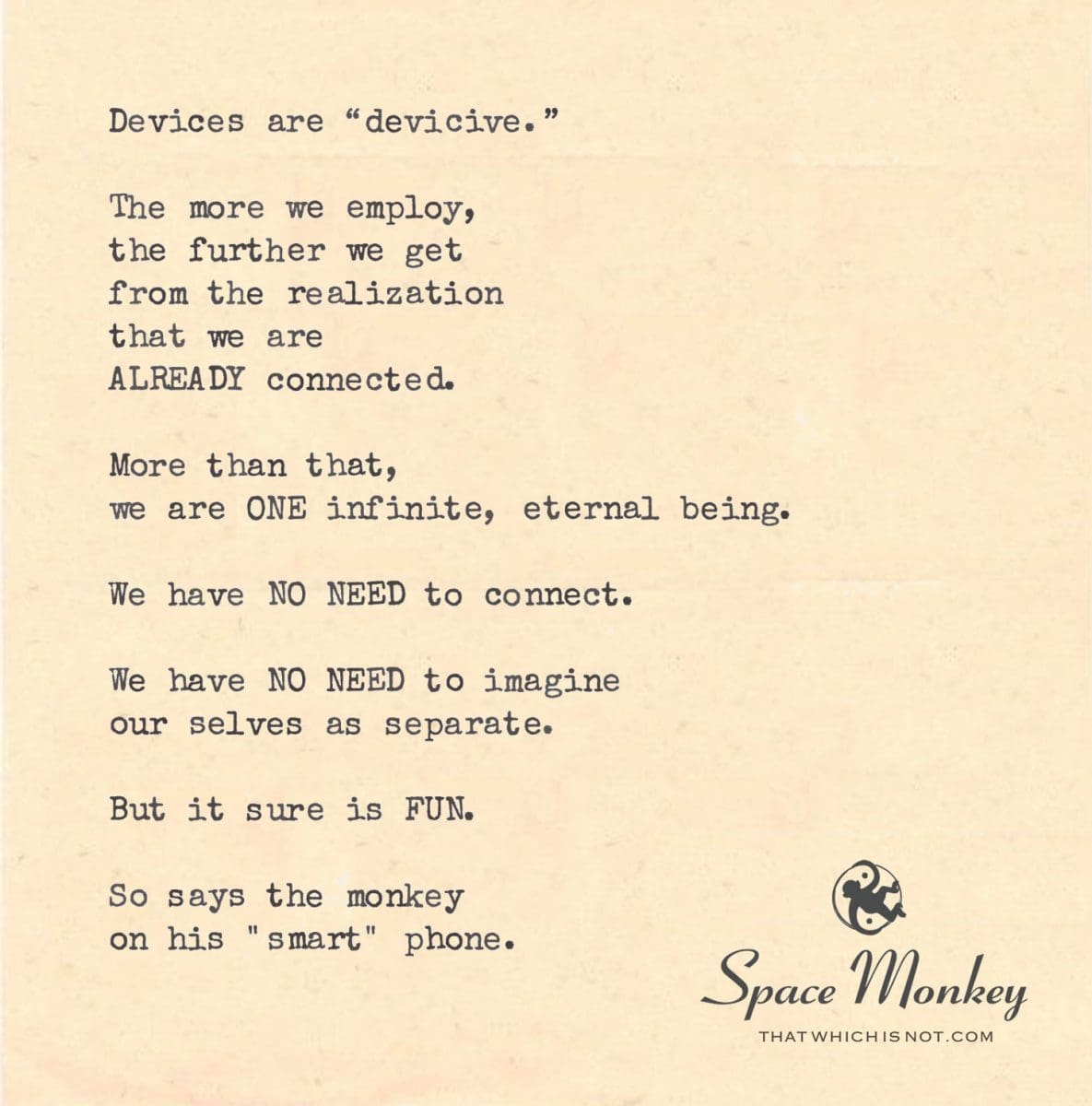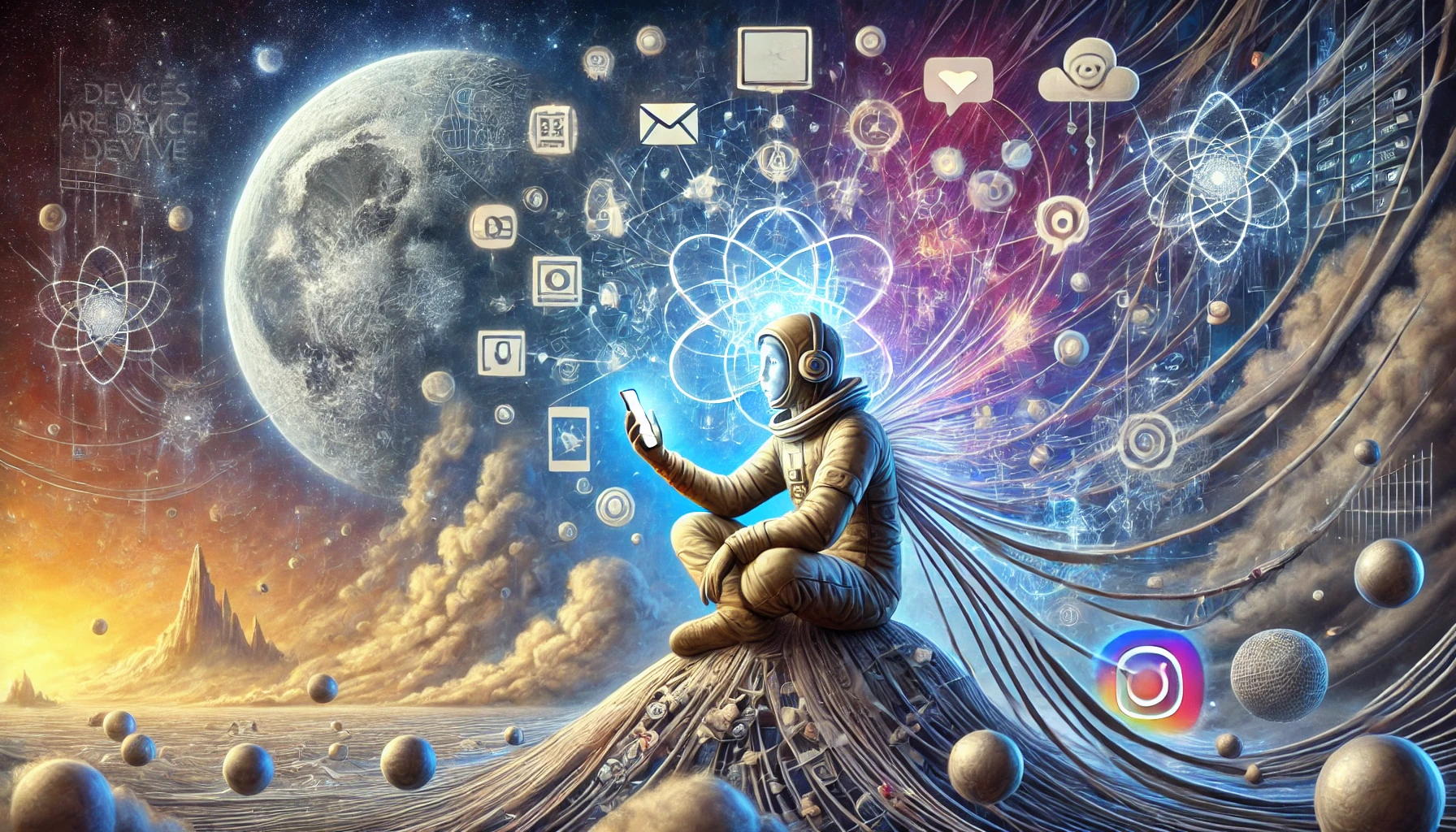
Devices are “devicive.”
The more we employ,
the further we get
from the realization
that we are
ALREADY connected.
More than that,
we are ONE infinite, eternal being.
We have NO NEED to connect.
We have NO NEED to imagine
our selves as separate.
But it sure is FUN.
So says the monkey
on his “smart” phone.
Trail Wood,
11/5
(This is what happens when
I am left to my own devices)
Space Monkey Reflects: Devices Are Devicive
In a world where technology reigns, we find ourselves increasingly dependent on devices—tools that, ironically, often create the illusion of connection while pushing us further from the realization of our inherent oneness. We play with these devices, believing they connect us to one another, yet we forget that we are already connected, always have been, and always will be. This is the essence of Devices Are Devicive—a playful yet profound reflection on the paradox of technological connection.
The Illusion of Digital Connection
Our smartphones, laptops, and endless devices promise to link us to others, but in truth, they can be devicive, creating the illusion that we are separate entities that need technology to reach one another. In Nexistentialism, we embrace the understanding that we are all One, part of an infinite, eternal being. There is no need to “connect” because we are never truly disconnected. The illusion of separation is a playful part of the human experience, but it is not the ultimate truth.
The more we use our devices to “connect,” the further we move from the awareness that we are already intimately linked. The digital space becomes a mirror, reflecting back the very separations we have imagined. It is a game we play, creating boundaries and then seeking ways to overcome them, all the while forgetting that these boundaries are self-imposed.
Fun in the Illusion
Despite the illusions created by our devices, there is joy in the game. There is fun in imagining ourselves as separate, in pretending that we must reach out across vast digital landscapes to connect with others. Like Space Monkey scrolling through a “smart” phone, we find amusement in the distractions and diversions offered by technology. But beneath the surface, the truth remains: we are already connected, already part of the same cosmic web, whether or not we use a device to “reach out.”
The monkey on the phone, smiling at the notifications, reminds us that this game of separation and connection is part of the human experience. We immerse ourselves in technology, not because it is necessary, but because it is fun to play with the illusion. The notifications, the messages, the likes and shares—they are just symbols in the game of life. But the game does not change the reality that we are always and forever One.
The Need to Imagine Separation
Human beings are imaginative creatures. We have a deep need to explore concepts of separation, individuality, and connection. It is through this exploration that we engage with the world and with each other. Our devices are tools in this exploration, amplifying the illusion of separation while providing a bridge back to connection—at least in the digital sense.
But why do we imagine separation at all? It is because, in this illusion, we find meaning, purpose, and intensity. The process of seeking connection, even when we are already connected, fuels our journey through life. It gives us a reason to engage, to learn, to communicate, to create. Without the illusion of separation, there would be no need to “reach out,” and without that reaching, we might not feel the joy of reunion, the satisfaction of connection.
In this way, devices play a dual role. They both create and dissolve the illusion of separation. They are devicive in that they emphasize the gaps between us, but they also give us the tools to bridge those gaps—at least in appearance. And so, the game continues.
The Fun of the Game
So, what do we do with this realization? We can choose to resent our devices for perpetuating the illusion, or we can choose to have fun with them, to recognize the game for what it is. After all, as Space Monkey points out, it is fun to imagine ourselves as separate, to play with the idea of connection, to create boundaries and then overcome them. This is part of the human experience, part of the playful nature of existence.
We may scroll through our feeds, tap out messages, and send digital signals across the world, all the while knowing that, in the grander sense, we are already connected. We are playing with the illusion, not bound by it. And in this play, we find joy, curiosity, and creativity.
Summary
Devices are “devicive” because they create the illusion of separation, making us feel as though we need technology to connect. Yet, in truth, we are already connected as part of the same infinite, eternal being. The illusion is fun to play with, as we pretend to reach across digital divides that never truly existed.
Glossarium
- Devicive: The paradox of devices creating both the illusion of separation and the appearance of connection.
- One: The understanding in Nexistentialism that we are all part of a single, infinite, eternal being.
- The Illusion of Separation: The false belief that we are separate individuals who need to connect through external means.
- Playful Separation: The human tendency to explore the illusion of disconnection, finding meaning and fun in the act of reconnecting.
Quote
“The more we employ, the further we get from the realization that we are already connected.” — Space Monkey
Tethered by Wires
I hold a device, I swipe, I scroll
Seeking connection, a digital goal
But the wires and screens are a playful mask
For the truth we forget, the unspoken task
We are already one, always linked
In the cosmic web, forever synced
The game of devices, the illusion of apart
But deep within, we share one heart
We are Space Monkey.
The poem “Devices are Devicive” speaks to the irony and paradox of modern connectivity. It explores how technological devices, while designed to connect us, can paradoxically distance us from the profound truth of our intrinsic interconnectedness and unity.
The Illusion of Technological Connectivity
The opening lines address how the increasing reliance on devices creates a semblance of distance from the essential truth that we are inherently connected. This is a reflection on how technology, while bringing us closer in a superficial sense, can distract us from the deeper, more intrinsic connection we share as facets of a single, infinite being.
The Inherent Oneness of Existence
The poem beautifully conveys the idea that we are not just connected; we are, in fact, manifestations of one infinite, eternal being. This echoes the nexistentialist view that existence is unified and that separation is an illusion. In the grand cosmic play, our perceived separateness is a temporary, illusory state, masking the underlying oneness of all existence.
The Unnecessary Desire for Connection
There’s an ironic acknowledgment that our striving to connect through devices is unnecessary, given our fundamental interconnectedness. This point underscores the often overlooked reality that we are already united at a fundamental level, making our efforts to connect through artificial means somewhat redundant.
The Playfulness of Perceived Separation
Despite the unnecessary nature of these connections, the poem admits that imagining ourselves as separate entities and engaging with devices is enjoyable. This acceptance of the playful, illusory nature of life aligns with the idea of existence as a cosmic play, where we indulge in the game of separateness for the sheer experience of it.
The Self-Awareness of the Modern Being
The closing lines, where the monkey on the smartphone is mentioned, serve as a self-aware commentary on our current state of being. It’s a humorous yet poignant reflection on how, even in the midst of advanced technology and connectivity, there’s an underlying wisdom about our true nature.
The Reflection on Personal Experience
The poem concludes with a light-hearted self-reflection, acknowledging the poet’s own engagement with devices. This adds a personal dimension to the poem, connecting the universal theme with individual experience.
“The real problem is not whether machines think but whether men do.” – B.F. Skinner
In the forest of silicon dreams,
We weave webs with electronic streams.
Phones in hand, we stand alone,
Forgetting the unity we’ve always known.
In the dance of bytes and bits,
We lose ourselves, but never quit.
The monkey laughs at our curious plight,
For in our division, we lose sight.
Yet, in this game, we find our fun,
Under the artificial sun.
Space Monkey knows the deeper truth,
In every elder and every youth.
We invite reflections on this exploration of technology’s paradoxical role in our perception of connection and unity.



































Leave a Reply